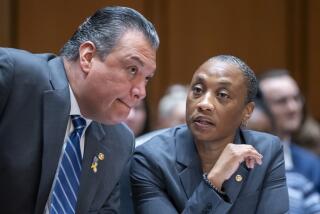Sen. Bernie Sanders ends filibuster
- Share via
Reporting from Washington — Sen. Bernie Sanders (I-Vt.) has ended a marathon filibuster of the proposed tax compromise, ceding control of the Senate floor after more than 8 1/2 hours.
“It has been a very long day,” he said as he concluded his remarks, including a five-hour period in which he spoke without interruption. “I do believe that if the American people stand up … I think we can defeat this proposal. I think we can come up with a better proposal which better reflects the needs of the middle class.”
Sanders, who caucuses with the Democrats, took to the floor at 10:25 a.m. EST Friday to “take a strong stand” against the legislation, which was formally introduced Thursday night. When he yielded the floor at 7 pm, a period in which he spoke for all but approximately 80 minutes, deferring to supportive colleagues
“I’m not here to set any great records or to make a spectacle,” he said at the start of his effort. “I am simply here today to take as long as I can to explain to the American people the fact that we have got to do a lot better than this agreement provides.”
The filibuster — or simply the threat of one — has stymied countless legislation in the 111th Congress. Even with a heavy majority, Democrats have often been unable to secure 60 votes needed to invoke cloture. But a filibuster in its traditional sense — a marathon speech by a senator or senators — hasn’t been seen in nearly two decades.
According to the Associated Press, the last true filibuster was mounted in 1992, when then- Sen. Al D’Amato (R-N.Y.) spoke for hours to oppose a change in a tax bill that would have hurt a home-state typewriter company.
D’Amato spoke for 15 hours and 14 minutes, padding his remarks by at one point singing “South of the Border” to fill time.
“They won’t need to change any plaques in the Strom Thurmond Museum,” said spokesman Mike Riggs, referring to the former South Carolina senator who holds the record for longest filibuster, at over 24 hours.
As an attention-grabber, the effort has been successful. A live stream of the speech on Sanders’ Senate website drew 12,000 views as of Friday afternoon, crashing the page at one point. His office has been flooded by phone calls as well. “Bernie Sanders” was a trending topic nationally on Twitter as well.
The White House, anxious that it was losing the message war, deployed President Obama and former President Clinton to the briefing room to tout the compromise.
Under Rule XIX of the Senate, senators who have been recognized to speak may do so for as long as they wish, and cannot be forced to cede the floor or even interrupted without their consent, according to the Congressional Research Service.
Sanders has twice deferred to his colleagues — for 45 minutes to Sherrod Brown (D-Ohio), and to Mary Landrieu (D-La.) for over a half hour.
“I don’t know how I’m going to vote, but I’m not voting quietly,” Landrieu said.
Even when he deferred to a colleague, Sanders had to remain standing on the floor. He could not eat — he hadn’t since arriving at the Capitol at 9 a.m. — nor go to the restroom. But he did take occasional sips of water.
Sanders’ main objection to the proposed compromise is the extension of tax cuts on income over $250,000. He says it would worsen the growing income imbalance to the benefit of the rich.
His effort comes as a growing collection of senators are seeking to reform the filibuster process. Sens. Tom Harkin (D-Iowa) and Tom Udall (D-N.M.) circulated a letter to their colleagues this week in which historians and Congressional scholars explain that the current filibuster procedure begs for changes.
A Udall spokesperson said the reform effort seeks to end not demonstrations like Sanders’, but ones in which senators simply need to threaten filibuster to stall Senate business.
“Blocking a vote with a filibuster used to be rare and reserved for extreme situations. Today every major bill faces one,” Udall’s office said. In fact, it contends there have been more filibusters since 2006 than the total between 1920 and 1980.
It was unclear whether Sanders’ filibuster would otherwise impact Senate business. The chamber was not scheduled to conduct significant business on Friday.
“This is a case where he has a lot of sympathy for his point of view on his side of the aisle,” said Steven Smith, a professor at Washington University in St. Louis who has studied the filibuster. “For him to take a day to express that point of view probably is considered to be a minor cost.”
twitter.com/mikememoli
More to Read
Get the L.A. Times Politics newsletter
Deeply reported insights into legislation, politics and policy from Sacramento, Washington and beyond. In your inbox three times per week.
You may occasionally receive promotional content from the Los Angeles Times.











